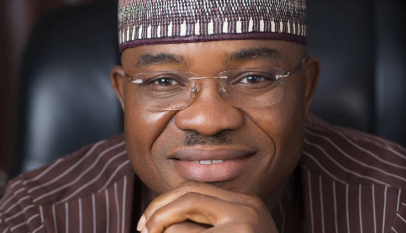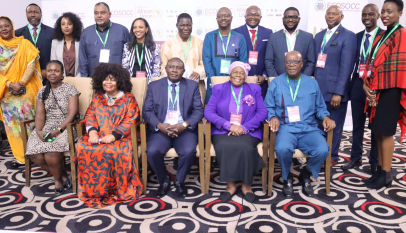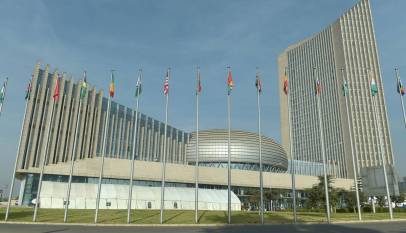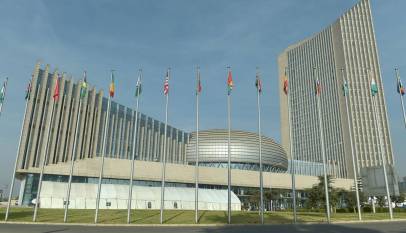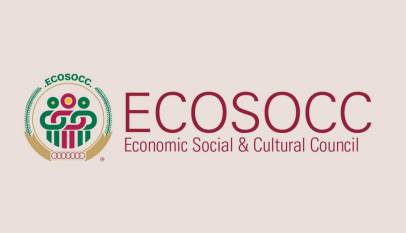Towards harmonized AU-RECs industrial policies for Africa’s economic integration
Last week, the African Union was on a strategic mission to the Economic Community of West African States (ECOWAS), aimed at fast-tracking the harmonization of Pan African industrialization frameworks, by the Regional Economic Communities (RECs); the AU also validated its study on financing Africa’s industrialization

As far as economic integration in Africa is concerned, the 8 Regional Economic Communities (RECs) are the building blocks of the envisaged African Economic Community (AEC), as enshrined in both the 1980 Lagos Plan of Action (LPA) and the 1991 Abuja Treaty. Therefore, achieving true economic integration on the continent – which would guarantee economies of scale in production and distribution of goods and services and consequently ensure African countries’ competitive advantage in global economic arena – is only possible when there is cooperation, alignment and coordination between the African Union and the RECs.
For decades, achieving effective cooperation between OAU/AU and the RECs have remained a daunting challenge hence the existence of a wide gap in policy formulation, coordination and implementation between the AU and RECs, across all sectors: governance, human rights, gender, peace and security as well as trade and industry. It was to bridge this gap that the 2007 summit of the AU Assembly in Accra, Ghana, adopted the Protocol on Relations between the African Union and the Regional Economic Communities, to facilitate the harmonisation of policies and ensure compliance with the provisions of the LPA and Abuja Treaty.
Likewise, in what was viewed as a mark of renewed commitment of African leaders towards the continent’s industrialization, the Accelerated Industrial Development of Africa (AIDA) programme was endorsed by Heads of State and Governments (HOS/G) as Africa’s main framework for continental industrialization, in 2008. The HOS/G also mandated the African Union Commission (AUC) to implement AIDA – in collaboration with the RECs, United Nations Industrial Development Organisation (UNIDO); United Nations Economic Commission for Africa (UNECA) and the African Development Bank (AfDB).
After what was a slow-start in the implementation of AIDA, in May 2018, an AIDA Implementation and Coordination Unit (ICU) was set up at the AU Commission’s Department of Trade and Industry (DTI), with financial support from UNIDO. The ICU was mandated to provide oversight, coordination and technical advisory on the implementation of AIDA and other related continental frameworks. In pursuance of this mandate, in August 2018, the AUC hosted a High Level Stakeholders Engagement Round Table on the Accelerated Industrial Development for Africa (AIDA) Monitoring and Evaluation Framework and Reporting System, in Abuja, Nigeria.
The maiden high-level stakeholders’ roundtable on AIDA was aimed at re-orienting key stakeholders such as the RECs, private and public sector actors as well as development and cooperation partners, towards rejuvenating momentum for implementing AIDA and other pan-African industrialization frameworks such as the Africa Mining Vision (AMV). As a strategy, AIDA focuses on “driving the integration of industrialization in national development policies especially in poverty alleviation strategies, development and implementation of an industrial policy with priority accorded to maximizing the use of local productive capacities and inputs, through value addition and local processing of the natural resources of each country.”
The AU-RECs mission
As a follow-up to the 2018 Abuja high-level engagement on AIDA, the AU last week carried out series of stakeholders’ engagements with the Economic Community of West African States (ECOWAS) – one of the 8 RECs that constitute the pillars of AEC. Other AU recognized RECs are Common Market for Eastern and Southern Africa (COMESA); Arab Maghreb Union (UMA); Community of Sahel–Saharan States (CEN–SAD); and East African Community (EAC). There is also Economic Community of Central African States (ECCAS); Intergovernmental Authority on Development (IGAD); and Southern African Development Community (SADC).
The weeklong AU-ECOWAS mission was part of the AU Commission’s quarterly flagship activities of interfacing with the 8 RECs, to fast-track the harmonization of Pan African industrialization frameworks by the RECs. The AU mission was thus aimed at building a stronger working relationship with the RECs, to ensure an effective industrial policy oversight as well as create a platform for knowledge exchange between AU and RECs on specific industrial policies.
As part of the mission, a one-day inter-REC meeting was hosted by the AUC’s Department of Trade and Industry (AUC-DTI) which was attended by 2 RECs i.e ECOWAS and COMESA. The AU’s Bureau of the Specialized Technical Committee on Trade, Industry and Minerals (STC-TIM) also participated in the session. The STC-TIM Bureau members in attendance was made up of high-level officials from the ministries of industry and trade from across the 5 AU regions, namely the Kingdom of Eswatini, Republic of Sierra Leone, Republic of Djibouti, and Republic of Gabon.
The Specialized Technical Committees (STCs) are sector-specific working groups answerable to the AU’s Executive Council; each STC is comprised of Member States’ relevant ministers and senior officials. As well as establishing synergies, linkages and complementarities in the areas of trade, industry and mining in line with Ten Year Implementation Plan of AU Agenda 2063, the STC-TIM provides strategic advice to AU’s policy organs and ensures implementation of agreed programs and projects.
Rongai Chizema, Chief Technical Advisor cum Head of the AIDA Implementation and Coordination Unit (ICU) at AUC-DTI said the rationale behind the involvement of the senior trade and industry officials from the STC-TIM in the AU-RECs interface was to facilitate easier persuasion of the trade and industry ministers of the STC-TIM, in respect of proposed industrial policies during the STC-TIM’s ministerial sessions, before the policies were escalated to the Executive Council and Summit of Heads of State.
“For a long time, there has been a missing link between AU and RECs in terms of policy harmonization; bureau members will help minimise the challenge of trying to convince their ministers at STC-TIM on certain policies, before they are escalated to the Executive Council and Assembly of Heads of State and Government. We are trying to bridge the gap between initiation, formulation and implementation of industrial policies at Member States, RECs and AU levels. The AU-RECs-STC-TIM interface is a very important exercise which we will continue to host,” he said.
Chizema said since the maiden high-level engagement on AIDA in 2018, the AU had continue to receive positive feedback from the RECs who believed the interface had helped bridged the AU-RECs gap, adding that the series of engagements had given the RECs a sense of ownership of the industrial policies hence will consequently ensure the AU’s industrial policies gain traction.
“Traditionally, the AU invites the RECs to Addis Ababa, now we are reaching out to the RECs in their own domain; this gives them a sense of ownership and will ensure our policies gain traction. This is called bottom-up approach to policymaking: it is broad-based, inclusive and meant to challenge the narrative that policies are being made at the top. Top-down approaches rarely gain traction. We hope this [bottom-up] approach will get buy-in across the continent so we can build a stronger framework, which allows policies to be developed in full consultation with the people for whom the policies are made; that way we can maximize policy outcomes and impact,” said Chizema.
Innocent Makwiramiti, a senior private sector development officer at COMESA who participated in the AU-RECs interface session believes the lack of effective coordination between AU and the RECs was affecting Africa’s economic integration agenda adding that the coming together of the AU and RECs to share experiences on what was happening at the RECs level was strengthening the relationship between the duo.
“By coming together, we are creating a rapport between the AU and RECs and down to Member States level; we are sharing experiences on what is happening at the Regional Economic Communities level. Therefore, the interface plays a big role in uniting the RECs and our mother body, the African Union, so we can collectively implement the continental integration agenda. At COMESA, we have learned a lot from the ECOWAS industrialization agenda, since our own policy only came into being in 2014; ECOWAS started much earlier,” he said.
The AU study on financing Africa’s industrialization
The AU-ECOWAS mission climaxed with a high-level stakeholders’ validation workshop for an AU study on financing Africa’s industrialization, commissioned earlier in 2019. The validation workshop, which generated vital recommendations on financing Africa’s industrialization, drew participants from government, RECs, the STC-TIM Bureau, private sector, business groups, and civil society. The participating organizations were Nigeria’s Federal Ministry of Industry, Trade and Investment; African Union Economic and Social Council (AU ECOSSOC); All Africa Association for Small and Medium Enterprises (AAASME) and the Nigeria Private Sector Alliance (NIPSA), amongst others.
Speaking about the study, the researcher, Ndubisi Nwokoma, a professor of financial economics cum director of the Centre for Economic Policy Analysis and Research at the University of Lagos, Nigeria, said Africa had to go “beyond conventional means in financing its industrialisation.” He identified as factors critical for fast-tracking the continent’s industrialization agenda, the Small and Medium Enterprises (SMEs); financing from Africans in diaspora, South-South cooperation as well as Domestic Resource Mobilisation (DRM).
Nwokoma said African economies were in recent times characterized by significant vulnerabilities such as uncertainties in commodity prices and currency depreciations, adding that the wide practice of exporting unprocessed commodities out of Africa had indirectly resulted in the transfer of wealth and jobs elsewhere. “Unsuccessful structural transformation, from agric and mining to value added industrialisation led to poor industrial base in Africa. Substantial investments and focus is needed in these, to propel the drive to industrialise the continent,” he said.
“Africa’s industrial sector has remained small since independence; hence, Africa’s share of global manufacturing exports has remained less than 1%, compared with over 16% for East Asia. On average, industry generates only $700 of GDP per capita in Africa, less than a third of Latin America’s $2500 per capita and barely a fifth of East Asia’s, $3400 per capita, according to UNECA. Notably, there is now a strong determination to foster industrial development on the continent,” said Nwokoma.
He said the adoption of the period 2016-2025 as the Third Industrial Development Decade for Africa (IDDA III) by the UN General Assembly – which is being coordinated by UNIDO – was meant to contribute to the implementation of the 2030 Agenda for Sustainable Development; as a follow-up to the 1980-1990 First Industrial Development Decade for Africa (IDDA I) and 1991-2000 Second Industrial Development Decade of Africa (IDDA II).
AU-RECs mission’s outcome
Following a weeklong bilateral and multilateral deliberations between the AU, RECs, STC-TIM and stakeholders in Africa’s industrial landscape, the AU mission arrived at important outcomes and resolutions. The mission also acknowledged the 2016 – 2025 Third Industrial Decade for Africa (IDDA III), as the rallying point for mobilizing global political advocacy, and joint partnerships to accelerate implementation of AIDA. Under UNIDO’s coordination, a joint roadmap had been drafted through a broad-based, multi-stakeholder engagement process; the road map which is now awaiting validation will guide implementation of programmes to drive Africa’s industrialization.
The mission’s outcome made specific recommendations to the AU, RECs, AU Member States, private sector as well as the African civil society, towards advancing Africa’s industrialization agenda. Amongst others, the outcome urged the AUC to sustain the current momentum of holding interface sessions with RECs so as to ensure coherence, effective coordination, and alignment in the implementation of Africa’s industrialization frameworks.
The AUC’s Department of Human Resources, Science and Technology (DHRST) was urged to take-up the responsibility of bridging the gap between research, academic institutions and industry, so as to ensure academic curricula were coherent, and responsive to the emerging skills and labour needs of industry. This was in recognition of current global production wave, hinged on high-tech under Industry 4.0, hence the need for skills development in the areas of Science, Technology and Innovation (STI), so as to enhance the continent’s preparedness for Industry 4.0.
Moreover, the RECs were urged to mainstream the pursuit of an integrated regional industrial development strategy, so as to foster the development of cross-border investment in the continent; liaise with the AUC–DTI to create a Public Private Dialogue (PPD) framework and platforms to drive resuscitation and acceleration of AIDA’s implementation; as well as expedite actions towards the implementation of regional infrastructure development projects, so as to strengthen cross-border investment initiatives, towards enhancing both industrialization and regional integration.
Furthermore, AU Member States were encouraged to provide the infrastructure and resources necessary for expanding the business and funding opportunities available to youth and women; ensure the growth of local industries was prioritized, alongside the implementation of instruments such as Special Economic Zones (SEZs), Industrial Parks, and Industrial Clusters; as well as provide responsive African Diaspora engagement platforms, legal and regulatory frameworks – to encourage their voluntary return and participation in national, regional and continental development and investment initiatives, aimed at accelerating industrialization.
Member States were further advised to deepen business-enabling environment reforms towards reducing the cost of doing business and enhancing private sector competitiveness, with a view to strengthening the private sector to fulfill its role of being the engine for growth and industrial development in Africa; bridge the skills gap of graduates of tertiary institutions, to reflect ever-changing needs of the private sector and industry and stay abreast of industry 4.0 high-tech related production systems; as well as strengthen academic programmes through integrating entrepreneurship skilling in education curricula, from primary level and beyond.
On the other hand, the African private sector was urged to prioritize the design of financing products for the strategic Small & Medium Enterprises (SMEs) sector so as to boost the continent’s employment creation capacity; deepen financial inclusion through mechanisms other than traditional banking services such as, crypto currency, block chain, and disruptive technologies; as well as actively mobilize for the setting up of a harmonized mechanism for leveraging African Diaspora’s social, human and investment capitals to drive Africa’s industrialization agenda.
Additionally, the African civil society (through the AU-ECOSOCC) was urged to work with Member States, national, regional, continental legislature i.e the Pan African Parliament (PAP) and private sector to ensure timely domestication and implementation of Africa Continental Free Trade Area (AfCFTA) and other relevant instruments; catalyze the strengthening of academic programmes by integrating entrepreneurship skilling, so as to respond to emerging needs of the private sector and keep abreast of Industry 4.0 high-tech related production systems, crucial for driving Africa’s industrialization agenda.


